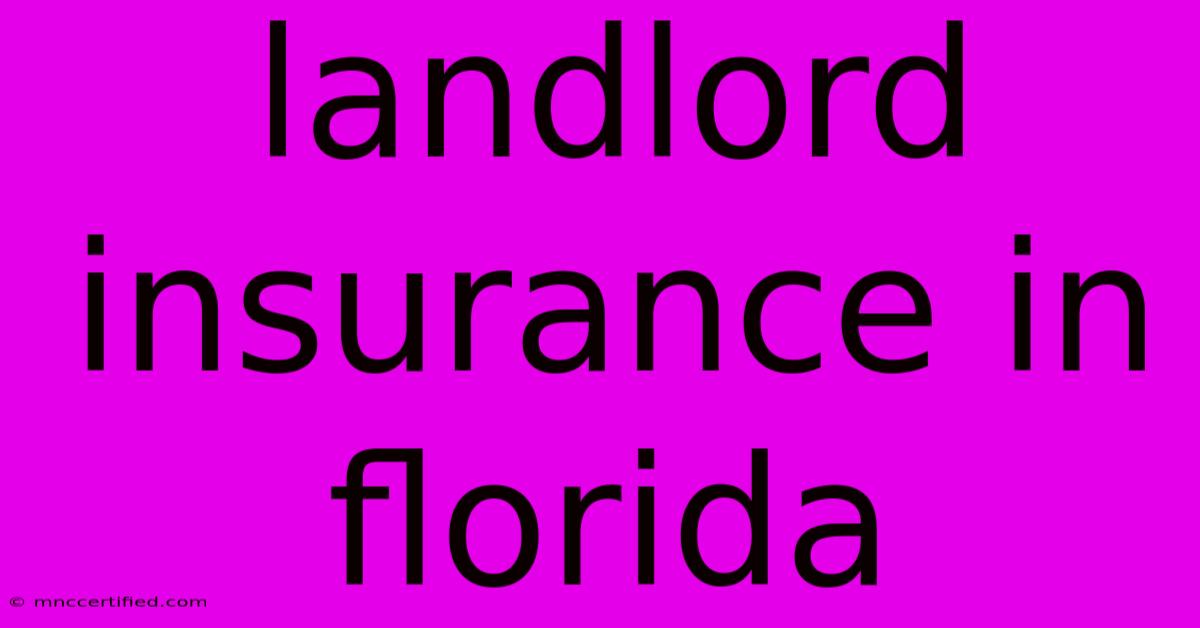Landlord Insurance In Florida

Table of Contents
Landlord Insurance in Florida: Protecting Your Investment
Finding the right landlord insurance in Florida is crucial for protecting your investment property and your financial future. The Sunshine State's unique climate and legal landscape demand a comprehensive policy tailored to your specific needs. This guide will walk you through everything you need to know to secure adequate coverage.
Understanding Florida's Landlord Insurance Landscape
Florida's property insurance market is notoriously complex. Hurricane risk, high litigation costs, and frequent claims have led to rising premiums and stricter underwriting requirements. This means simply relying on your homeowner's insurance won't suffice when you own rental properties. Landlord insurance, also known as rental property insurance, is specifically designed to cover the risks associated with owning and renting out a property.
Key Differences Between Homeowner's and Landlord Insurance
While both protect your property, they differ significantly:
- Liability Coverage: Landlord insurance offers higher liability coverage, crucial for protecting you against lawsuits from tenant injuries or property damage. Homeowner's insurance typically offers lower limits, insufficient for rental property risks.
- Coverage for Tenant's Belongings: Landlord insurance does not typically cover tenants' personal belongings. Encourage tenants to secure renters insurance.
- Vacancy Coverage: Many policies require specific endorsements for periods of vacancy. Florida's fluctuating rental market means this is important to consider.
- Loss of Rent Coverage: This crucial element compensates you for lost rental income if your property becomes uninhabitable due to a covered peril (like a hurricane or fire). This is absent in standard homeowner's insurance.
Essential Coverages in a Florida Landlord Insurance Policy
A comprehensive Florida landlord insurance policy should include:
- Dwelling Coverage: This covers damage to the structure of your rental property from covered perils like fire, wind, and hail. Consider adding hurricane coverage, given Florida's vulnerability.
- Liability Coverage: Protects you against lawsuits resulting from accidents or injuries on your property. Adequate liability coverage is paramount given the potential for high legal costs in Florida.
- Loss of Rent Coverage: This compensates you for lost rental income while repairs are underway due to a covered event.
- Additional Living Expenses (ALE): Covers additional costs incurred if you or your tenant must temporarily relocate due to damage to the property.
- Personal Property Coverage: This covers your personal belongings kept on the property, such as appliances or tools.
Factors Affecting Your Landlord Insurance Premium in Florida
Several factors will influence the cost of your landlord insurance premium:
- Property Location: Properties in high-risk hurricane zones will command higher premiums.
- Property Value: Higher-valued properties require greater coverage, resulting in higher premiums.
- Property Age and Condition: Older properties or those in need of repairs might attract higher premiums.
- Claims History: Previous insurance claims can significantly impact your rates.
- Deductible Amount: Choosing a higher deductible can lower your premiums, but be prepared for out-of-pocket expenses in case of a claim.
- Type of Property: The type of rental property (single-family home, apartment building, etc.) also affects premiums.
Finding the Right Landlord Insurance in Florida: A Step-by-Step Guide
- Assess Your Needs: Determine the level of coverage you require based on your property's value, location, and rental income.
- Get Multiple Quotes: Compare quotes from several reputable insurance providers. Don't just focus on price; consider the breadth of coverage offered.
- Review Policy Details Carefully: Understand the terms, conditions, exclusions, and deductibles before signing anything.
- Consider Endorsements: Explore additional endorsements, such as flood insurance or coverage for specific risks relevant to your property.
- Choose a Reputable Provider: Opt for a well-established insurance company with a strong reputation and reliable claims service.
Beyond the Policy: Protecting Your Investment
Landlord insurance is a vital component of protecting your investment, but it's not the only step. Consider:
- Regular Property Maintenance: Preventing damage through proactive maintenance can reduce your risk of claims.
- Thorough Tenant Screening: Selecting responsible tenants reduces the likelihood of property damage or liability issues.
- Detailed Lease Agreements: Ensure your lease agreement clearly outlines tenant responsibilities and liability.
By understanding the nuances of Florida's landlord insurance market and diligently protecting your property, you can secure your financial investment and peace of mind. Remember, finding the right coverage is an investment in your long-term success as a landlord.

Thank you for visiting our website wich cover about Landlord Insurance In Florida. We hope the information provided has been useful to you. Feel free to contact us if you have any questions or need further assistance. See you next time and dont miss to bookmark.
Featured Posts
-
Confirmed Lineups Tottenham Vs Roma
Nov 29, 2024
-
Shaboozey Hype Nfl Fans Troll Bears Harlow
Nov 29, 2024
-
North Miami Thanksgiving Parade A Full Report
Nov 29, 2024
-
Territory Codes For Insurance
Nov 29, 2024
-
Treating Tmj Zoe Balls Experience
Nov 29, 2024